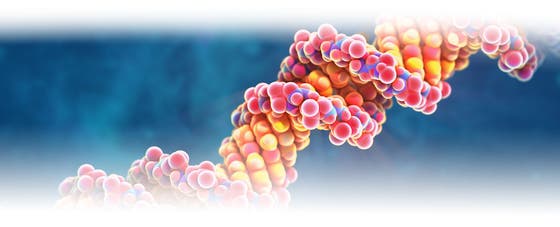Genetic risks
Neurogenetic research aims to unravel underlying molecular genetic mechanisms of diseases, ultimately leading to the improved diagnosis and treatment of patients.

Genetic risk uitklapper, klik om te openen
Familial forms of these diseases exist, in which case the disease is inherited from parent to offspring in a clear pattern. In Mendelian disorders, a single inherited mutation can explain the phenotype. However, most neurogenetic diseases do not follow this pattern. They are often genetically complex diseases, caused by the interplay of a large number of genes with several contributing environmental factors or, less frequently, a single, often de novo, mutation. Each familial and complex form of disease requires its own experimental approach.
Within the UMC Utrecht Brain Center, neurogenetic studies are focused on several human diseases affecting the brain and nervous system. This includes epilepsy, amyotrophic lateral sclerosis (ALS) and related diseases, childhood-onset spinal muscular atrophy (SMA), cerebrovascular disease, psychotic disorders including schizophrenia and bipolar disorder, and developmental disorders including autism and ADHD.
Studying familial disease uitklapper, klik om te openen
and to be able to successfully collaborate internationally within the context of consortia. Collecting detailed clinical information for the (sub) phenotyping of large numbers of patients and controls is also a major focus within UMC Utrecht Brain Center. In addition to familial and large case-control studies, other types of studies, like twin and triplet studies, are designed to search for (de novo) genetic variation as well.
Familial disease is studied by collecting different types of information. This includes information about multiple generations of very well documented families, genealogical information, blood (for DNA and RNA) and blood vessel walls (of aneurysms/vascular malformations), cerebrospinal fluid, brain tissue obtained from epilepsy surgery patients, other tissues including skin biopsies (to obtain fibroblasts for iPS cells) and, where possible, (snap frozen) autopsy material. For complex diseases, large numbers of samples are collected in order to have adequate power for important discoveries
Studying gene expression and methylation uitklapper, klik om te openen
The biological function of genes can reveal essential information on the pathophysiological mechanisms that play a role in these disorders. This information is crucial for the development of novel, more effective treatment strategies.
Since we know that the identification of important genes and proteins in relation to disease is accelerated using a broader genomic approach, the study of gene expression and methylation is also emphasized. Many genes and proteins interact and genomic studies of relevant affected tissue will help to reconstruct the perturbed gene networks in neurogenetic diseases.
Using the newest technology uitklapper, klik om te openen
Neurogenetic research in the UMC Utrecht Brain Center employs advanced techniques, such as next-generation DNA and RNA sequencing, and has invested considerably in high-performance cluster computing and bioinformatics to manage next-generation derived data.
